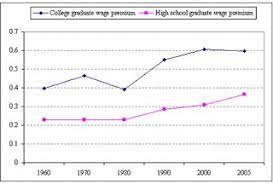What the hell you talkin’ about? I got a han’bill says they got good wages, an’ little while ago I seen a thing in the paper says they need folks to pick fruit.
Is understated irony among the greatest of Steinbeck’s gifts? Readers of the Grapes of Wrath from 1939 through today know that there is no work for the Joad family in California. The readers know; the characters do not.
Pa continues: I got a han’bill says they need men. Don’t make no sense if they don’t need men. Costs money for them bills. They wouldn’ put ’em out if they didn’ need men.”
But of course men are not needed. Not for twenty cents an hour. Not for ten cents an hour. By inviting tens of thousands of men to apply for a few hundred jobs, the boss ensures that he can hire men who will pick fruit all day in exchange for “nothin’ but biscuits” because “the more fellas he can get, an’ the hungrier, less he’s gonna pay.” And a man with hungry kids will do anything, work for any wage, to feed his children.
Uproot your family, sell every possession you own, drive across the country to California at enormous risk and expense. Is the modern-day equivalent depleting your retirement account to finance a college education? Or borrowing against the equity in your home to pay for your child’s degree?
Steinbeck’s characters believe that there is honest work paying a living wage if only they work hard enough, pick enough cotton. Do modern families believe that an undergraduate degree in philosophy or sociology will make a difference in earning power if only students study hard enough, write enough papers, attend enough lectures?
The disparity between what Steinbeck’s characters believe and what the readers know is poignant and telling. Present day families don’t know whether they are being manipulated.
Could the following have been written on our contemporary handbill, the Internet? College graduates have higher lifetime earnings than their non-college peers.
College graduates have higher lifetime earnings than their non-college peers. Yes, and men are, on average, faster than women. But that doesn’t mean I can run with Joan Benoit, Jackie Joyner-Kersee, or Genzebe Dibaba. Not unless you have a wheelbarrow handy to come pick up my lifeless body. In general, men are faster than women. But not all men are faster than all women. College grads have higher lifetime earnings than their non-college peers. But not all college grads earn more than their non-college peers.
Just the same, I would love to run with some of my heroes. And to be fair, there is something to be said for spending four years on campus: interacting with brilliant professors, studying with inspired peers, connecting with the most powerful insights of civilization—these are all meaningful. But “is this education worthwhile?” is distinct from “is the education a good investment?”
“Lemme tell ya what to do when ya meet that fella says he got work. Lemme tell ya. Ast him what he’s gonna pay. Ast him to write down what he’s gonna pay. Ast him that. I tell you men you’re gonna get fooled if you don’t.”
It behooves young people heading off to college to know why they are going. It is well known that graduates with chemical engineering degrees earn significantly more than those who studied literature. And to be fair, few students majoring in English could successfully study chemical engineering. It’s a rare student who could put down their novels and pick up a differential equations text. Nor are most engineers known for their ability to analyze and write about literature.
But heading off to college with the simplistic belief that “college graduates earn more than students who don’t attend college” is almost as forlorn as the conviction of the Joad family that there is work for able bodied, hard-working folks in California, that they will be able to feed their families if they put in an honest day’s work.
And it’s better to read about irony than to have irony slap you in the face: I’m earning $48,000 a year teaching high school English and I have $140,000 in student loans. A person earning $48,000 a year will have a tough time paying off $140,000. They will have to put off buying a home, starting a family, saving for retirement. That $140,000 of debt will be hanging around their neck long after the have written their last paper about the symbolism of the albatross in Coleridge’s Rime of the Ancient Mariner.
“S’pose you got a job a work, an’ there’s jus’ one fella wants the job. You got to pay ‘im what he asts. But s’pose they’s a hunderd men.” … His eyes hardened and his voice sharpened. “S’pose they’s a hunderd men wants that job. S’pose them men got kids, an’ them kids is hungry. S’pose a lousy dime’ll buy a box a mush for them kids. S’pose a nickel’ll buy at leas’ somepin for them kids. An’ you got a hunderd men. Jus’ offer ’em a nickel—why, they’ll kill each other fightin’ for that nickel.
I suppose if there were a demand for teachers, they might earn more than $48,000 a year. Or if there were a demand for teachers, they might be graduated with less than $140,000 in debt.
The Joads have no options. The crops have failed in Oklahoma and the family has been evicted from their land by immoral bankers. College applicants have choices, choices they need to consider carefully before accepting the lure of expensive college options.







4 thoughts on “The Grapes of Wrath”
Too late for me. Although I have not made the mistake of cashing in my retirement I did buy in to the dream, my daughter’s dream actually. She wanted to attend a prestigious NY performing Arts university. They were very selective and she was accepted. This same university is now ranked #1 in student and parent indebtedness. The performing arts, along with the technical and logistical part of the industry is essentially dead in NY and many other places. My daughter now works at Starbucks with $100k of debt. In retrospect, I guess the lesson is to pop the dream balloon early because it’s going to deflate eventually anyway. I realize that sounds incredibly pessimistic, but I’d rather be a pessimist without $100k in potential debt than an optimist with a dubious future. I don’t see how these kids will have any acceptable standard of living, that is until I expire and leaver her an inheritance. I am assuming our government will leave some crumbs for her.
“This same university is now ranked #1 in student and parent indebtedness.” This is as tragic as it is common. My heart is breaking for you good people. What happened to your family is unconscionable.
I am keeping a good thought for your daughter going forward, wishing there were more I could do to help.
Respond to me privately if you would with the name of the school. I will reach out to my colleagues and share your story. Maybe the only good to come from your experience is to serve as a warning to other young people and their families.
The world your students live in is a lot sadder than the world you and I grew up in. When I was in junior high school we were given math problems which compared the lifetime earnings of people with and without high school diplomas, with and without university graduation. Propaganda for us kids to “stay in school”. And maybe it was true, even though at that time it seemed to me a poor reason for just staying in school.
There was then little or no idea of going into debt to get such a diploma. And the fees and time invested in going to a trade school were less. Everyone was not encouraged to go to university whether they wanted to or not. Least of all unless they had family with money to burn. The inflation of degree requirements for everything and the costs of the competition among schools is sad. Thanks for reminding people that, just because they put a notice on a flyer, or on the Net, doesn’t mean it’s true, or will be true.
Your mom took a secretarial course having gone through the eighth grade and worked as much as she liked well into her 80s. 🙂